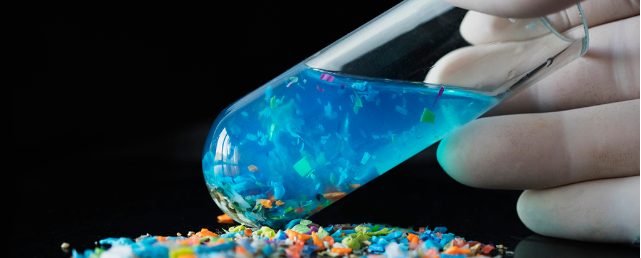


 3:42:43
3:42:43  2024-12-25
2024-12-25  1099
1099

Sadly, we know that microplastics are getting everywhere, including our drinking water – but researchers have developed a new way to tackle the problem: a filter made of a rather unusual combination of material, which is able to remove up to 99.9 percent of tiny plastic fragments from water.
The researchers, led by a team from Wuhan University in China, combined both chitin (derived from squid bone) and cellulose (derived from cotton) for their 'Ct-Cel' foam filter. Both materials are found in abundance in nature, cheap to adapt, and sustainable.
They then tested their filter against numerous different types of plastic, finding it did an excellent job with a wide variety of fragment sizes and plastic types – including some of those most commonly seen in microplastic pollution.
Even when reusing the same filter up to five times, removal rates stayed above 95 percent. This high performance was maintained in tests on agricultural irrigation water, lake water, still water, and coastal water.
"This biomass fibrous framework (Ct-Cel) showcases an excellent adsorption performance for polystyrene, polymethyl methacrylate, polypropylene, and polyethylene terephthalate, " write the researchers in their published paper.
"The affinity for diverse microplastics is attributed to the transformation of multiple intermolecular interactions between different microplastics and Ct-Cel."
Those "multiple intermolecular interactions" refer to the variety of bonding reactions the newly developed filter is capable of. It can adapt as it encounters different types of plastic, and adjust the way it 'grabs' each one.
Even better, the filter mostly continues to work well in the presence of other pollutants besides microplastics, including bacteria and solvents. That's going to be important if this solution is going to be scaled up and used across multiple real world scenarios. That said, some chemicals did reduce the filter's adsorption abilities.
While both chitin and cellulose had shown promise in removing pollutants from water before, getting them working together required some careful chemical manipulation to break down and rebuild their internal structures – making them better catchers for microplastics in water.
As promising as this is, it's important to remember that the filter is still in the early stages of development. Larger scale tests need to be carried out before the viability of producing the filter commercially can be investigated.
However, with some 4.6 billion metric tons of plastic waste now thought to be in the environment, we need all the help we can get. That number is only going to go in one direction, too: these plastics don't break down in the environment, and we're producing more and more of the stuff with each passing year.
Keeping plastic out of the environment in the first place would be the preferable course of action, but scientists continue to investigate ways of removing it from the environment – including some that are simpler than others.
"This work may open up prospects for functional biomass materials for cost-efficient remediation of microplastics in complex aquatic environments," write the researchers.
Reality Of Islam |
|

Labor short

A new ultra

Batteries p
 9:3:43
9:3:43
 2018-11-05
2018-11-05
10 benefits of Marriage in Islam
 7:5:22
7:5:22
 2019-04-08
2019-04-08
benefits of reciting surat yunus, hud &
 9:45:7
9:45:7
 2018-12-24
2018-12-24
advantages & disadvantages of divorce
 11:35:12
11:35:12
 2018-06-10
2018-06-10
 6:0:51
6:0:51
 2018-10-16
2018-10-16
 12:10:56
12:10:56
 2022-11-17
2022-11-17
 3:18:29
3:18:29
 2022-12-24
2022-12-24
 11:2:27
11:2:27
 2022-10-06
2022-10-06
 9:42:16
9:42:16
 2022-10-19
2022-10-19
 7:0:55
7:0:55
 2022-05-17
2022-05-17
 10:47:11
10:47:11
 2022-11-22
2022-11-22
 2:5:14
2:5:14
 2023-01-28
2023-01-28
 5:41:46
5:41:46
 2023-03-18
2023-03-18
| LATEST |